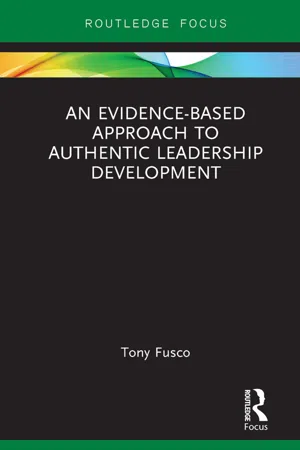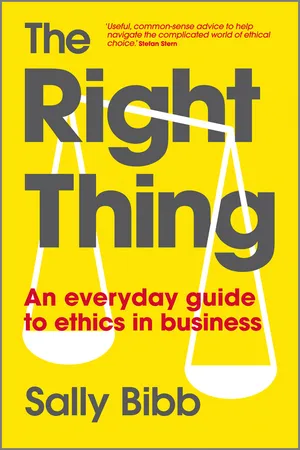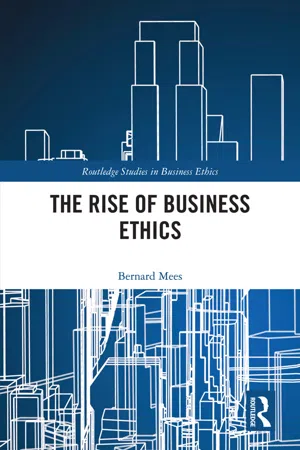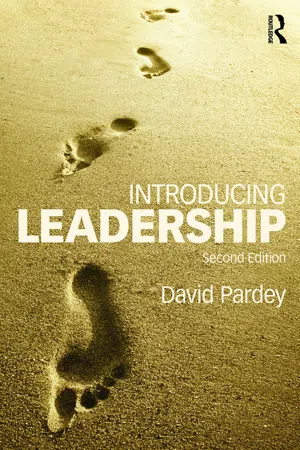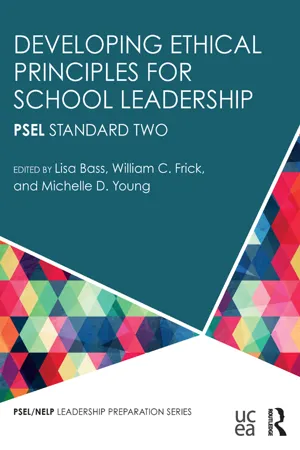Ethical Leadership
Ethical leadership in business refers to the practice of leading with integrity, honesty, and fairness while considering the impact of decisions on all stakeholders. Ethical leaders prioritize ethical behavior, transparency, and accountability, setting a positive example for their teams and fostering a culture of trust and respect within the organization.
7 Key excerpts on "Ethical Leadership"
- eBook - ePub
Business Ethics
New Challenges for Business Schools and Corporate Leaders
- Paul E Peterson, O.C. Ferrell(Authors)
- 2016(Publication Date)
- Routledge(Publisher)
...However, it should be seen as tentative and open to revision. The ethical leader frames actions in ethical terms. In short, the ethical leader views leadership as a fully ethical task. This entails taking seriously the rights claims of others, the effects of one's actions on others (stakeholders), and how acting (leading) in a certain way affects one's character and the character of others. There is nothing amoral about the ethical leader, who recognizes that his or her values may well turn out to be a poor guidepost. The ethical leader takes responsibility for using sound moral judgment. The ethical leader articulates and embodies the purpose and values of the organization. It is one thing to tell a good story, one that is compelling and morally rich. But it is another thing to embody it and live it. Ethical leaders must do both, and it is difficult to do so in today's business environment where everyone lives in a fishbowl. Many political leaders fail to embody the high-minded stories they tell at election time, and recently business leaders have produced cynicism through the revelations of numerous scandals and bad behaviors. The ethical leader connects the basic value proposition to stakeholder support and societal legitimacy. The ethical leader must think in terms of enterprise strategy, not separating business from ethics. Linking the basic raison d'être of the enterprise with the way that value gets created and society's expectations is a gargantuan task. But the ethical leader never hides behind the excuse of "It's just business." The ethical leader creates a vibrant conversation about ethics, values, and the creation of value for stakeholders. Too often business executives think that having a statement of values card or a compliance approach to ethics has solved the ethics problem. Suffice it to say that Enron and other troubled companies had all of this apparatus...
- eBook - ePub
The Psychology of Ethical Leadership in Organisations
Implications of Group Processes
- Catarina Morais, Georgina Randsley de Moura(Authors)
- 2018(Publication Date)
- Palgrave Macmillan(Publisher)
...We explore this through leadership because leaders set the example and inspire others as central members of groups, teams, and organisations. Leaders have a crucial role in the communication of the organisation’s mission and values which, as good as they may look on paper, are useless if the leaders ’ behaviours are not consistent with them (Kanungo & Mendonça, 1996). For example, if an organisation says that they value employees ’ ideas but actual employees perceive that every time one of them communicates an idea the leader disregards them, the organisation’s message and the leader ’s behaviour are not congruent and, therefore, a different message is perceived by the employees (e.g. that the organisation does not value their ideas after all). On the other hand, if the leader makes the time to hear the employee and discuss the idea (even if not implemented), the message portrayed by the organisation and the leader ’s behaviour will be consistent. As a consequence of their position within the organisation and the growing awareness of the impact of organisational decisions on society, leaders are under increasing pressure to be ethical and to guide their decisions in an ethical manner. In this chapter, we will outline two major concepts behind this idea of Ethical Leadership —ethicality as more of an individual or a social aspect of the self. We review the proposed theories that frame the conceptualisations and differentiate Ethical Leadership from other leadership styles. The practical consequences of Ethical Leadership to organisations will also be explored. Ethical Leadership: Concepts and Theoretical Frameworks Ethical Leadership was first defined by Brown, Treviño, and Harrison (2005) as “the demonstration of normatively appropriate conduct through personal actions and interpersonal relationships, and the promotion of such conduct to followers through two-way communication, reinforcement, and decision-making” (p. 120)...
- Tony Fusco(Author)
- 2018(Publication Date)
- Routledge(Publisher)
...However, in reviewing this list, it becomes apparent that values from both the self-enhancement and self-transcendent categories are reported by leaders who have completed the Authentic Leadership Group Coaching, such as skill, social power and goal autonomy from the self-enhancement category and broad-mindedness, self-discipline and responsibility from the self-transcendence category. But all of this still leaves us with the unanswered question – why do values, ethics and morals even matter for leadership, particularly business leadership? Ethics, morals and values in business Ethics has been described as primarily a collective and communal enterprise, 5 the same as organisational life itself – that it only really becomes relevant within a web of relationships, such as a business and the community that business is embedded within and serves. Here, we can see the point and benefits of the three main characteristics said to define ethical behaviour: justice, fairness and equity. Ethics have been described as “how we decide to behave when we decide we belong together” (p.28). They are the standards we use for judging the conduct of one party whose behaviour affects another party and how we protect one person’s rights and needs alongside the rights and needs of another. In this context, ethics are not detached from business as business is not detached from life. Business and life have the same bottom line – people (p.29). Business is a human institution and a basic part of the communal fabric of life (p.30). In Moral Leadership and Business Ethics, Al Gini argues businesses therefore should ask a fundamental question: “What ought to be done in regard to others?” (p.29). 5 Gini talks of the ethicist, Norman Bowie, who suggests that the existing disconnect between business and ethics comes from the competing world views of economists and ethicists...
- eBook - ePub
The Right Thing
An Everyday Guide to Ethics in Business
- Sally Bibb(Author)
- 2010(Publication Date)
- Wiley(Publisher)
...Nor perhaps are some of the actions needed in the business to make them a reality. The first step is to convince themselves that there are benefits beyond just being ethical for the sake of it. There are leaders who believe that there is no other way to be. They are people with high moral standards. Then there are those who have less of an innate moral driver. They don’t have a natural orientation towards Ethical Leadership and need to see clear and logical benefits. THE BENEFITS OF ETHICAL BUSINESS Ethisphere, a think-tank specializing in ethics, publishes an annual ‘World Most Ethical Companies Ranking’. 2 Entrants are scored in seven categories: Corporate Citizenship and Responsibility (20%); Corporate Governance (10%); Innovation that Contributes to the Public Well Being (15%); Industry Leadership (5%); Executive Leadership and Tone from the Top (15%); Legal, Regulatory and Reputation Track Record (20%); and Internal Systems and Ethics/Compliance Program (15%). ‘Leadership and Tone from the Top’ make up 15% of the total score that an organization can achieve. I would argue that all the other categories flow from it and that leadership is the most important and influential determinant of ethics in an organization. The other categories are influenced by the person in charge. There is no getting away from the fact that the person at the top sets the standard of behaviour throughout the entire organization. They have the opportunity to place the highest premium on ethics if they choose to. Because of an increase in known corporate misdeeds and subsequent scandals in the 1990s and early 2000s leaders who were not naturally inclined to be of high ethical character ran more risk of being exposed for failures of integrity. Ethical behaviour is now on the agenda of many of these leaders because they see the downside of not paying attention to it. • Competitive advantage - Consumers are increasingly favouring companies that demonstrate ethical practices...
- eBook - ePub
- Bernard Mees(Author)
- 2019(Publication Date)
- Routledge(Publisher)
...Michael Hoffman Center for Business Ethics at Bentley University: “Unlike ordinary people we hold leaders responsible for things that they do not do” (Ciulla 2018, 372). Leaders have greater responsibilities than their followers, but “some leaders are fortunate because of the social-historical context that they are in and the fact that their initiatives turn out well for them. Others are unlucky because a hurricane, accident, or other unforeseeable event ruins their best-laid plans” (Ciulla 2018, 372). Ciulla takes a long historical view on leadership, concluding that “throughout history and across cultures, we find that people want the same moral qualities in their leaders”. From ancient Egyptian times up to today, people want leaders who inspire trust and who are not obviously governed by self-interest. Ciulla cites Plato advocating in his Republic that “anyone who is really a true ruler doesn’t by nature seek his own advantage but that of his subjects” (Plato 1992, 23). Self-mastery, compassion and care are also perennials of traditional leadership lore—what makes a good leader is the perception of virtue among others (Ciulla 2018). In Ciulla’s work, philosophical ethics takes a full turn; hers is a historian’s ethics that mines traditional sources of wisdom. Although Barnard had argued that moral leadership was one of the key requirements for successful business management, much of the early development of leadership studies was not overtly concerned with ethical issues other than a broader commitment to promoting more humane forms of leadership. When a sense of moral leadership did make its way decisively into organisational psychology, however, it seemed to be more excitable and manipulative than it was clearly a theory of business ethics...
- eBook - ePub
- David Pardey(Author)
- 2016(Publication Date)
- Routledge(Publisher)
...Instead it emphasises that to be an effective leader you must be clear what your basic sense of right and wrong is and feel confident to make judgements based on those rules. In 2013 the Institute of leadership (ILM) and Business in the Community (BITC) worked together on a research project which explored values in organisations. (The report is available on the ILM website as Added Values: The Importance of Ethical Leadership) We found that over four fifths of respondents said that their organisations had a statement of values or ethics; they were claimed to be most common in larger organisations (over 90 per cent of those in organisations with 1,000+ employees) and least common in smaller ones (but still nearly three quarters of those with under 50 employees), although the sample tended to exclude those working in very small businesses (i.e. under ten employees) where it is likely no formal statement will exist. What is noticeable is that values were most commonly developed by the senior managers and/or the board; the research suggests that this makes them far less likely to be explicitly referred to by anyone other than these senior managers and directors. The more that people are involved in developing them, the more likely they are to see them as meaningful. This is important, because the culture of the organisation will reflect the espoused values, but if these aren’t the ones that the people at the top want them to be, they could well be a different set, one that has been developed informally by the employees over time and which they regard as the true values of the organisation. Having such values is important. There was clear evidence in the research that the incidence of unethical behaviour was least likely when there was a clear statement of values, especially when this was developed collaboratively by employees. (At a round table with some senior figures from the City of London prior to the launch of the research, one member despaired...
- eBook - ePub
Developing Ethical Principles for School Leadership
PSEL Standard Two
- Lisa Bass, William C. Frick, Michelle D. Young, Lisa Bass, William C. Frick, Michelle D. Young(Authors)
- 2018(Publication Date)
- Routledge(Publisher)
...CHAPTER 2 Modeling Ethical Leadership Being an Ethical Leader Means Modeling Principles of Self-Awareness, Reflective Practice, Transparency, and Ethical Behavior Marla Susman Israel and Lisa Bass CHAPTER OVERVIEW In this chapter, the authors discuss the importance of the school leader’s role in promoting Ethical Leadership through self-awareness, reflective practice, transparency and ethical behavior. Authors emphasize how ethical leaders strive to lead by example and this chapter illuminates the habits of mind and behaviors such leaders display in their daily practice in schools. Within this chapter, the narrative and activities are designed to help the student of educational leadership clarify his or her own beliefs in a wider context and consider ways of reasoning through challenging ethical dilemmas in the volatile environments that typify the 21st-century educational milieu. Clarifying the competing interests within an ethical dilemma along with the act of moral reasoning create the foundation for transparency in one’s leadership practices. Flowing from this self-awareness, self-authorship, enhanced ethical reasoning, and authentic leadership are approaches to leadership that define transparency. This transparent, moral leadership includes a commitment to shared governance, an open process in decision-making and agenda setting, and an inclusive orientation to the wider community beyond the school walls. This chapter is intended to provide future and practicing administrators with a mindful framework for constructing the questions necessary to realize the moral dimensions that are currently at stake in our educational institutions in order to build reasoning, motivation, and implementation strategies to solve these ethical dilemmas as they arise within our schools (Rest, et al., 1999)...


